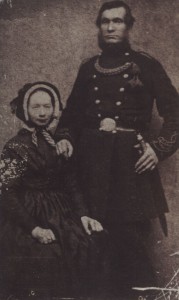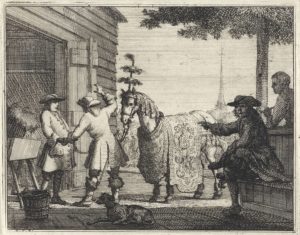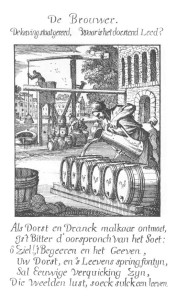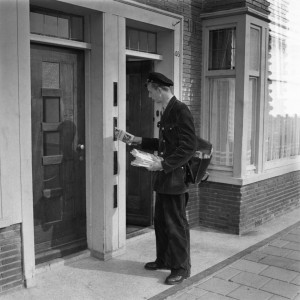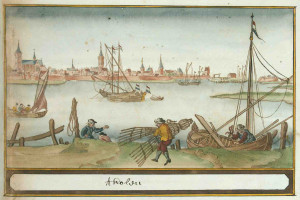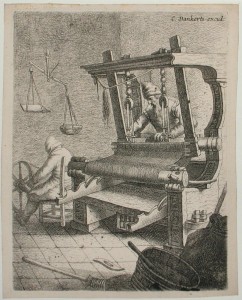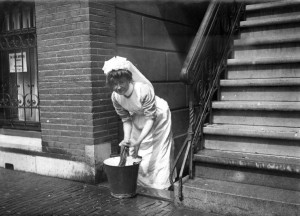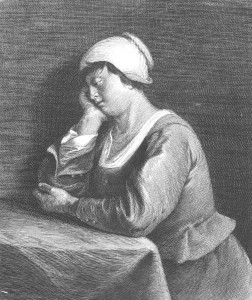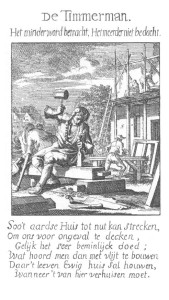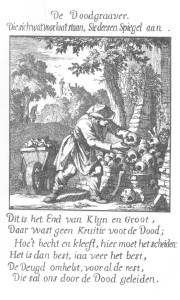A veldwachter was a police constable. In 1858, a national police force was established in addition to the municipal constabulary. From that period onwards, you will find a difference between a gemeenteveldwachter (municipal constable) and rijksveldwachter (national constable). Appointments of national constables can be found in the Staatscourant, which is available online at Delpher, or in the Algemeen Politieblad, which is available at the website of the Centraal Bureau voor Genealogie … [Read more...]
Dutch term – Handelaar
A handelaar was a trader. Handelaren could mostly be found in cities, not villages, and were often quite well-to-do. Sometimes, specific words were used to show what people were trading in: a graanhandelaar traded in grain, a fietsenhandelaar traded in bicycles, and a handelaar in koloniale waren traded in colonial goods. You can also use newspapers, court records, or tax records to find out what your ancestor was trading in. Another word for handelaar is koopman (merchant), where … [Read more...]
Seven Ways to Find Your Dutch Ancestor’s Occupation
Finding your ancestor's occupation is a great way to learn more about his life and can be a gateway to finding more records. Here are six different ways you can find out what your Dutch ancestors did for a living. 1: Civil registration records If your ancestor lived in the Netherlands after 1811, you should be able to find your ancestor in the Civil Registration. Birth records list the occupation of the father, sometimes of the mother, and of the witnesses. Marriage records list the … [Read more...]
Dutch term – Postbode
A postbode is a mail man. For large parts of the 1800s and 1900s, the government controlled the delivery of the mail and mail men were civil servants. You can find their personnel and pension records at the Nationaal Archief in The Hague. … [Read more...]
Dutch term – Visser
A visser is a fisherman. Fishing was a common occupation in the coastal towns of the Netherlands, including those surrounding the Zuiderzee (now: IJsselmeer). Willem Beukels, a fisherman from Biervliet in Zeeland, invented the technique of gibbing herring, which allowed Dutch fishermen to remain at sea for longer periods of time before the fish would go bad. The secret of gibbing gave the Dutch a commercial advantage. Du tch herring is still renowned. … [Read more...]
Quick tip – Occupations ran in the family
Occupations often ran in the family. The eldest son usually inherited the father's business, and would step in his father's footsteps. Guilds often had friendly terms for children of members, with reduced fees for apprenticeships and membership. Even younger sons who could not take over their father's business often found similar work. The son of a shoemaker might become a tailor, for example. Of course, there are exceptions. The younger sons of farmers may have moved to the village or the … [Read more...]
Dutch term – Dienstbode
A dienstbode was a domestic servant. Many dienstbodes lived with the families where they served. Because dienstbodes moved a lot, many municipalities started keeping seperate "dienstbodenregisters" [registers of domestic servants] as part of the population registration to keep track of who lived where. … [Read more...]
Dutch term – Particulier
A particulier is a private person, someone not working for the government and not a business. For instance, when you buy something, it is important whether you buy it as a particulier (consumer) or as a business since your warranty may be different. In some records, the term was used to indicate a person who did not receive an income from current employment or running a business. This does not necessarily mean that the person was unemployed or poor, it could also be a person of independent … [Read more...]
Dutch term – Gezel
A gezel is a journeyman, a craftsman who had already finished basic training but had not passed his master's exam yet and had not been admitted to the guild. The term is also used to indicate someone who worked for a boss rather than having their own shop, so a gezel doesn't mean the person is young. You can find the word gezel used as a suffix to other occupations, for example a timmermansgezel (journeyman carpenter) or schoenmakersgezel (journeyman shoemaker). You won't find these composite … [Read more...]
Dutch term – Doodgraver
The term doodgraver literally means 'dead digger.' It is the person who digs the graves for the dead. In larger towns, this was a full-time occupation. In small towns, the church sometimes hired poor people to dig the graves, making them work for their allowance. A grave digger was not only supposed to dig the graves but also to collect any bones that would surface before the dogs could get to them. These bones would often be stored in a 'knekelhuisje' [bone house] in the corner of the … [Read more...]
